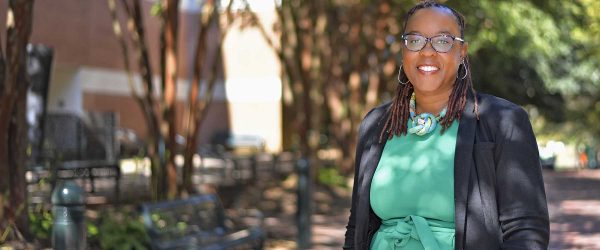Professor advocates for literacy, leadership for girls and women through scholarship and mentorship

Janaka Bowman Lewis is passionate about using her voice to help girls and women find their own voices, in the classroom and in the greater community. Recently, she was selected by the Charlotte Business Journal (CBJ) for its 40 Under 40 Awards for 2020, which recognizes young professionals who are making major progress in their careers as well as a positive impact in their communities.
As director of the Women’s and Gender Studies Program and an associate professor of English, Lewis uses her research, scholarship and community engagement to build connections between the University and the Charlotte region.
“Mentorship is very personal for me. As an undergraduate at Duke University, I was supported by Black women administrators and professors, and now, as part of the Duke Women’s Forum, I have the opportunity to create programming here in Charlotte,” said Lewis, who furthered her education at Northwestern University, completing a master’s and Ph.D. in English. “I think about the legacy of my grandmother who became an educator; she went to college while raising two children and as my grandfather fought in Korea.”
Central to her efforts in the community, whether with the Charlotte Literary Festival, Center City Literary Festival, the Learning Enrichment and Achievement Program or Rise2Thrive Inc., Lewis seeks to demonstrate how the University can positively affect Charlotte.
“As an urban research university, UNC Charlotte has to lead important conversations in the classroom and the community,” said Lewis. “We must make our work accessible to the citizens of the Charlotte region, too.”
This year’s civil unrest across the country offers an example of how the University can lead with regard to issues of social justice, she noted.
“We, in Charlotte, are not removed from racial violence. When I teach and volunteer in the community, I talk about how social justice shapes where we live. We can ask, ‘Where did Black Lives Matter come from?’ But as the Black Lives Matter mural on Tryon attests, it is a fact that Black lives have always mattered, and when violence takes Black lives away, it affects us all,” said Lewis.
African American literature is an effective resource for facilitating difficult conversations with younger children. Lewis’ “Brown All Over” features a young boy’s attempt to use all of the colors in his crayon box with the help of his family members and his realization that he is part of the color spectrum, too.
“Through talking with children, we can explore how to celebrate being African American, which goes along with teaching and celebrating African American literature in the community,” Lewis stated.
The novel, “The Hate You Give,” is another work Lewis uses effectively. The story of a girl who struggles to find her voice following the murder of a friend helps her to teach where one’s voice originates. She uses the work to discuss the preschool to prison pipeline, a mechanism by which Black girls and boys who challenge the system are often removed from the classroom through suspension or expulsion. Her goal is to provide instruction on how to speak up effectively while staying on the path to high school graduation.
Literature can help young people explore a number of topics, including racial history, slavery, land ownership among African Americans and even the history of farming in communities.The subject of farming is one that Lewis worked with Charlotte-Mecklenburg Schools teachers to develop related curriculum as part of the Charlotte Teachers Institute, a collaboration among CMS, UNC Charlotte and Johnson C. Smith University.
“Often inner-city school children do not know where fresh fruits and vegetables come from, so the Rosa Parks Farmers Market, for example, is a way to help educate students about food and food insecurity along with an important figure in the fight for civil rights,” said Lewis.
As director of Women’s and Gender Studies in the College of Liberal Arts & Sciences, Lewis has advocated for undergraduates to be able to major in the discipline; approval for such an offering is pending with the UNC System.
“For a number of years, our program consistently has attracted 300 minors, and alumni who have gone on to careers in business, government and health care cite leadership lessons learned from our program, especially related to gender equity,” noted Lewis. “If approved, the major will have a focus on women’s health and leadership; it will be interdisciplinary in nature drawing upon courses from several colleges.”
African American cultural studies, with a focus on African American girls and women, is an area Lewis explores in the classroom and community. In summer 2019, she was one of 40 scholars nationally selected for a residency at the National Humanities Center in the Research Triangle Park. She is working on the project “Black Girlhood and the Power of Belonging.” She also authored “Freedom Narratives of African American Women: A Study of 19th Century Writings.”
Honored by her inclusion in CBJ’s 40 Under 40 Awards for this year, Lewis plans to continue to use her voice to advance opportunities for girls and women, at UNC Charlotte and beyond.
“The more we think and talk about our history, the more it becomes part of a real conversation rather than a topic in the abstract,” said Lewis.